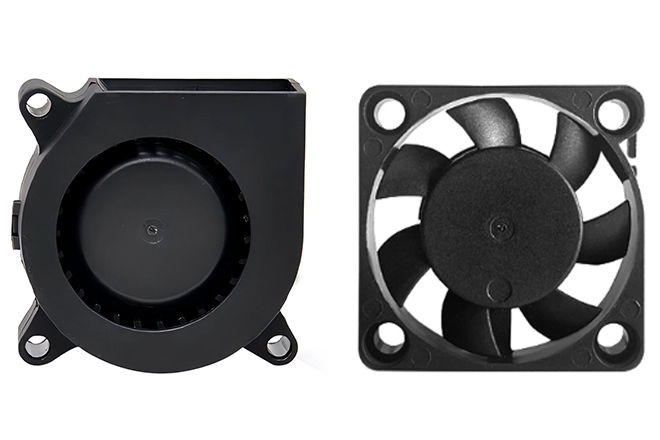

Choosing the right cooling solution is crucial for the optimal performance and longevity of electronic devices and machinery. While both blowers and fans serve the purpose of air circulation, they operate differently and excel in different applications. This article dives into the core differences between blowers and fan coolers, helping you make an informed decision for your specific needs.
A fan cooler, typically an axial fan, is designed to move air parallel to the axis of rotation. The impeller, equipped with fan blades, draws air in and pushes it out in the same direction. This creates a consistent airflow suitable for general cooling purposes.
Applications: Fan coolers are commonly used in computer cases, home appliances, and other applications where consistent, widespread cooling is needed. They are also integral components of CPU heatsink fans designed to reduce the CPU's temperature.
A blower, also known as a centrifugal fan, moves air perpendicular to the axis of rotation. Air enters the blower through an opening, is accelerated by the rotating impeller, and then exits the housing at a 90-degree angle. This design allows blowers to generate higher pressure airflow than axial fans.
Applications: Blowers excel in applications requiring concentrated airflow or where overcoming static pressure is important. Common uses include HVAC systems, industrial machinery, and electronics that require targeted cooling.

The primary difference lies in how they generate airflow. Fans deliver a high volume of air at low pressure, making them suitable for cooling large areas. Blowers, on the other hand, deliver a lower volume of air at higher pressure, making them ideal for applications requiring focused airflow or the ability to push air through obstructions.
Advantages:
Energy Efficient: Generally consume less power than blowers.
Low Noise: Typically quieter operation.
Cost-Effective: Usually more affordable.
Disadvantages:
Lower Pressure: Less effective at overcoming static pressure or cooling densely packed components.
Less Focused Airflow: Not ideal for targeted cooling.
Advantages:
High Pressure: Excellent for overcoming resistance and directing airflow.
Targeted Cooling: Suitable for cooling specific components or areas.
Disadvantages:
Higher Power Consumption: Usually requires more power to operate.
Noisier: Can generate more noise due to higher speed and pressure.
Higher Cost: Typically more expensive than fan coolers.
The best choice depends on the specific application. Consider these factors:
Airflow Requirements: How much air needs to be moved?
Static Pressure: Does the air need to be pushed through any obstructions?
Space Constraints: Are there size limitations?
Noise Level: Is quiet operation important?
Power Consumption: Are there energy efficiency requirements?
For general cooling of large areas with minimal obstructions, a fan cooler is often the better choice. For applications requiring focused, high-pressure airflow, a blower is usually more effective.
At WELLSUNFAN, we understand the importance of efficient and reliable cooling solutions. With over 10 years of experience in the industry, we specialize in the research, development, design, production, and sales of high-quality cooling fans. Operating from a modern 10,000-square-meter factory with a professional team of 300 people, including a dedicated R&D team of more than 20, we are committed to providing tailored solutions to meet your unique thermal management needs. WELLSUNFAN boasts a monthly output capacity of up to 3 million fans, ensuring efficient and high-quality production.
We offer a comprehensive range of cooling solutions, including:
DC Cooling Fans: Ideal for small electronics and devices.
AC Cooling Fans: Suitable for larger equipment and industrial applications.
EC Cooling Fans: Energy-efficient options for various applications.
CPU Heatsink Fans: Designed to reduce CPU temperature.
DC Blower Fans: Providing focused, high-pressure airflow.
Our products are used extensively across numerous fields, including:
3D printers
Commercial refrigerators
Computer cases
Medical equipment
UPS power supplies
Home appliances
New energy solutions
Security systems
5G equipment
Wellsunfan adheres to the principle of "Customer First, Quality Foremost". We follow ISO9000 and ISO14001 quality standards, strictly controlling various operation processes. We have obtained international safety certifications such as UL, ETL, TUV, and CE.
Contact us today to discuss your cooling requirements and discover how WELLSUNFAN can optimize the performance and reliability of your products.